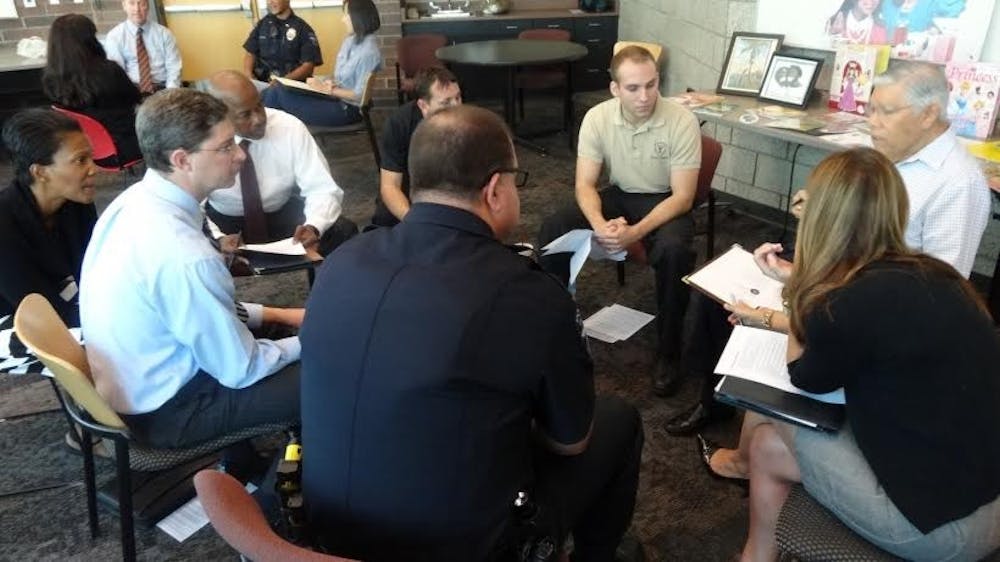Following a national outcry to monitor pubic authority figures, officers at the Tempe Police Department recently attended a workshop to learn about privilege and bias.
The workshop, called “The Perils and Perks of Privilege,” taught Tempe police officials how the perception of any given situation could vary based on one’s own biases during several three-hour long sessions in May and June.
Neal Lester, ASU Project Humanities director and the workshop’s co-facilitator, initially developed the training session as part of a movement to educate the public about privilege with Yvette Johnson, a published author and public speaker.
The workshop could be adapted to train any demographic, within or without law enforcement, how to look through every day experiences through a lens of personal awareness, Lester said.
“Part of the privilege and bias is to look at the systems that are in place,” Lester said. “You need to look at privilege through this lens of…how (we) view privilege in this American society, where white is privileged over other races, male over female, cisgender over transgender.”
Lester said the department contacted him after hearing of the workshop’s development through ASU in light of national cases of police brutality, such as the deaths of Eric Garner and Freddie Gray.
“One of the things that they really wanted to pounce upon…was that people think (police officers) are racist,” Lester said. “I don’t have that assumption.”
Rather, Lester said multiple issues factor into these public issues.
“When we’re talking about privilege and bias, we’re also talking about intersectionality,” Lester said. “You can’t talk about Ferguson as just being about race. It’s about economics, it’s about education –– it’s about all of those things.”
Throughout the three-hour workshop, Lester and Johnson explained how bias affects the outcome of all situations, including the day-to-day issues officers face every day.
However, Lester said workshops like “The Perils and Perks of Privilege” should take place in more departments than Tempe alone.
“It would be great if the whole Valley did it, because these conversations are happening on other places,” Lester said. “Across the nation, people are talking about bias and privilege now. …I do hope that these discussions continue.”
Johnson, who also co-facilitated the workshop, said she and Lester framed the session as a conversation so that it appealed to the officers as people more than public authority figures.
“This is not just a police issue,” Johnson said. “We really tried to make sure that they knew they weren’t in trouble. The conversation that we had with them was a national conversation.”
Approaching the topic of bias in law enforcement from a standpoint of a discussion rather than a lecture allowed the workshop to reach out to more officials, Johnson said.
“If we had gone in there saying, ‘This is what’s wrong with police,’ it would have made it harder to have honest conversations,” Johnson said. “If you come out just to say, ‘Okay, you guys have issues and aren’t treating communities right,’ it’s hard for (someone) to open up and listen.”
Johnson said it is important to show that all people have their own privileges in order to address the way these potential biases can affect humanity.
“We really tried to approach is from a place of ‘Hey, we’re all in the same boat together,’” she said. “Neil and I have privilege. We have bias. It’s a humanity issue and we all have to take responsibility.”
Tempe Police Department Lt. Noah Johnson said the officers hope to show Tempe residents that the department is making an effort to become more aware of citizen needs.
“There have been officers who have made poor decisions, and so the uniform is painted with a broad brush,” Johnson said. “However, as individual officers, we can make a difference by listening to the concerns. …We care for the citizens we serve and seek to do our job the best we can.”
Johnson said that it is important for officers to remember that, while following standards is important, it is their top priority is to serve the communities they protect.
“I truly believe people want police officers to be their heroes and they want that trust and connection to law enforcement,” Johnson said. “As a police officer, I need to go beyond the facts and take time to listen and understand the challenges of individuals and the communities I police.”
Through this workshop, Johnson said he and his fellow officers learned how to be more available to the Tempe community with one lesson:
“Don’t wait for a crisis to interact,” Johnson said. “Reach out and be part of the community when things are going well and build that trust and open dialogue. Be intentional about involving yourself with community and individuals different than your own and learn about others struggles and successes.”
Reach the reporter at aplante@asu.edu or follow her on Twitter @aimeenplante
Like The State Press on Facebook and follow @statepress on Twitter.




